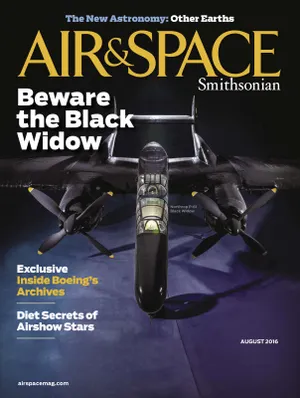The Trouble With Airport Security
An expert on passenger screening says we should be looking for evil intent, not just confiscating scissors and bottles of liquid.
/https://tf-cmsv2-smithsonianmag-media.s3.amazonaws.com/filer/62/a0/62a0629d-ded9-409e-acf4-6f1d46179b57/denver_security.jpg)
Philip Baum is the editor of Aviation Security International, as well as the managing director of Green Light, a London-based aviation security training company that specializes in hijack management and passenger profiling. He spoke with Senior Associate Editor Diane Tedeschi in June.
Air & Space: Just before the Brussels airport bombing in March, two of the alleged bombers walked through the airport pushing luggage carts, each with his left hand in a black glove. Shouldn’t this have drawn the attention of airport security?
Baum: Well, it’s very easy after the event to look at the image and highlight the fact that two of the men each wore one glove. Or—more obviously—that all three men had checked luggage but no carry-on baggage. In a live operational environment it’s not so easy. But we ought to be relying much more on behavioral analysis and deploying staff at entrances to terminal buildings, taxi drop-off zones, station platforms, and in the lines to the checkpoint. Airport security officers should be focused on observing behavior and questioning people if concerns arise.
How effective are the airport security measures put in place in the United States after 9/11?
The passenger screening checkpoint is more robust now than ever before and, at the very least, seems to be an effective deterrent. However, we need to consider whether it is just good “security theater” or whether it is truly capable, if operated by personnel of the right caliber, of identifying most of the prohibited items we are searching for. Here lies the problem: We should not be searching for prohibited items. We should be searching for negative intent. Who cares whether a passenger has a pair of scissors or a box cutter if there is no intent to use them as a weapon?
We all know we can go to an airport duty-free shop and buy glass bottles which, if broken, are far more dangerous. Aviation security ought to be based more on common sense. Yes, I believe passionately in profiling—not racial profiling, but differentiating between passengers based on a risk analysis. People argue against it, yet every other security agency uses the technique, including customs, immigration, and quarantine officers assigned to airports.
/https://tf-cmsv2-smithsonianmag-media.s3.amazonaws.com/filer/d0/8d/d08d2d52-b958-4c79-9e73-c6384b18813a/33a_aug2016_mg_4052_live-wr.jpg)
With the tightening of security for inflight operations, have airports themselves become more of a target for terrorists?
Absolutely. As a European, I find it incredible that the United States does not routinely screen all personnel accessing security-restricted areas of airports—a fundamental flaw in the system allowing the insider threat to be exploited.
The Transportation Security Administration in the U.S. uses human workers to man screening devices searching for weapons and banned items, but undercover tests conducted by the Department of Homeland Security discovered that human screeners repeatedly fail to detect banned items at security checkpoints. Should the TSA consider some type of artificial intelligence at security checkpoints to assist the human screeners, who might be prone to boredom and fatigue?
The problem is not just one of human error: The caliber of the staff employed, their level of motivation, and the disciplinary process in place to address security failings are all important factors to conisder. We are inspecting far too many people for a ridiculous range of materials that are—in themselves—not a threat. The whole liquid-aerosol-gel regime introduced a decade ago has resulted in vast numbers of people being inconvenienced and having perfectly safe products confiscated. Screeners see a bottle of wine and think they have found a threat. Maybe we should be encouraging a regime that actually addresses the threat and identifies those who might try to attack the industry.
You’ve said that airport security is too predictable. What could make it less predictable?
We all know what we can take to the airport. We all know the process we’ll go through, so it is fairly easy to plot one’s way around it. I’d like to see airports equipped with a range of security technologies, where we don’t know which one will be used when we set out to the airport.
What is your opinion of the aviation security practices in Israel?
Israel is the home of profiling, and though it wouldn’t be practical to adopt the Israeli system, we could be using elements of it, especially common sense. Profiling based on behavioral analysis—not race—is the best way to identify insider threats, suicidal pilots, hijackers, unruly passengers, victims of human trafficking, traffickers, and other criminals.
